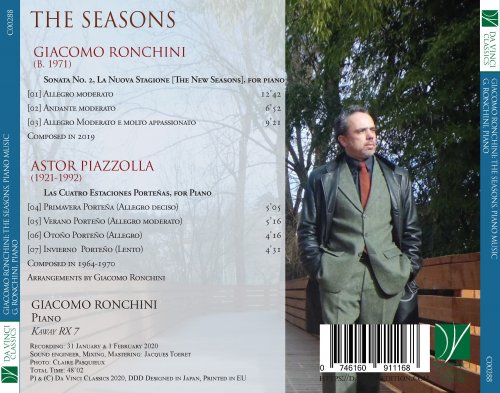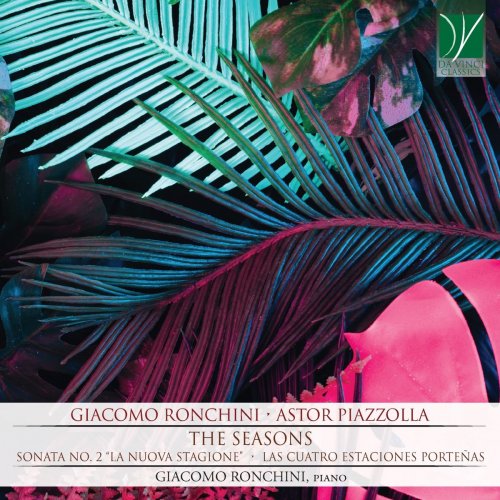
Giacomo Ronchini - Giacomo Ronchini, Astor Piazzolla: The Seasons (2020)
BAND/ARTIST: Giacomo Ronchini
- Title: Giacomo Ronchini, Astor Piazzolla: The Seasons
- Year Of Release: 2020
- Label: Da Vinci Classics
- Genre: Classical
- Quality: FLAC (tracks)
- Total Time: 48:05 min
- Total Size: 170 MB
- WebSite: Album Preview

Tracklist:
01. Sonata No. 2, La Nuova Stagione: I. Allegro moderato
02. Sonata No. 2, La Nuova Stagione: II. Andante moderato
03. Sonata No. 2, La Nuova Stagione: III. Allegro Moderato e molto appassionato
04. Las Cuatro Estaciones Porteñas: I. Primavera Porteña (Allegro deciso) (For Piano)
05. Las Cuatro Estaciones Porteñas: II. Verano Porteño (Allegro moderato) (For Piano)
06. Las Cuatro Estaciones Porteñas: III. Otoño Porteño (Allegro) (For Piano)
07. Las Cuatro Estaciones Porteñas: IV. Invierno Porteño (Lento) (For Piano)
The New Season, Second Piano Sonata, was wholly composed in 2019. As for the previous Sonata of 2017-2018, the dimensions are wide, but the sonata-form seems to centre here in an obvious manner the classical structure. The harmonic choices act with two aims: on the one hand they tend to explore every thematic idea in all its nuances that the same key permits, on the other hand they aim to underline, with modulations to the far tones, the great sections of the composition, opening them to new perspectives of sound dimension.
The minute attention to the harmonic detail lets the listener feel inside the coherence of the musical discourse, quite as if he were accompanied in a travel, also its variety of nuances.
The lyricism, the passionate enthusiasm and, in the same time, the intimate creative vein, define this work as if it were the alter ego of the Sonata of 2017-2018 and also the title, a secret tribute to the father, seems to suggest a sort of rising or rediscovered spring compared to the tormented past.
The choice to propose with the new Sonata compositions by Astor Piazzolla, entered by now in the classical musical repertoire of the 20th century, seems to indicate an interpretation for the own music. Despite the great difference between the two musical styles, the aim of the strict belonging to the own cultural roots in the name of a naturalness of intents, is evident not obviously dictated by a commercial operation focused on an easy usability. Looking for a link to the great masters of the past would be reductive and misleading towards a compositional style by now well delineated and recognizable. Love and sweat poured on the most famous piano composers are perceived as deep cultural root.
The need of the emotive involvement expressed with the use of the tonal harmony as essential means from the DNA, is the declaration of a communication and musical telling still possible and browsable, also to the light of different cultural influences rooted in the contemporaneity and filtered from their personality. The New Season is so the vision of the classical music today, such as the same social message of other musical expressions more popular, but with all the peculiarities that outline the own vocation to the cultured music without compromises. Listening to with a mind free from superstructures, this music is able to accompany us with its narrative flight in a long emotional travel, letting us perceive also aspirations and personal dreams that, thanks to the honesty of the message, we can embrace. For an artist, music is a philosophy, a way of life and here, life, with its thousand nuances of intensity of affection expressed by different times in the Tempo, is the unquestioned hero.
Composed between 1964 and 1970, Las Cuatro Estaciones Portenas by Astor Piazzolla give back the variety of tones and colours of the passing of the seasons of Buenos Aires through the changes of rhythm, tenderness and violence of the typical passions of Tango nuevo. Ronchini presents a personal and rare piano version according strictly to the style and the original compositional material, basing on the available publications and inspiring himself to the records effectuated between 1969 and 1972 by the Argentinian composer with his own Quintet. Such a meaningfulness permits that the arrangement for piano is seen as if it had been originally thought for the solo instrument.
The relevance, the rhythm, the wide dynamic and brilliant writing don’t make people regret the tonal variety of the organic instrumental ensemble typical of the Argentinian Tango conceived by Piazzolla.
Liner Notes by Luçia Cortez
The minute attention to the harmonic detail lets the listener feel inside the coherence of the musical discourse, quite as if he were accompanied in a travel, also its variety of nuances.
The lyricism, the passionate enthusiasm and, in the same time, the intimate creative vein, define this work as if it were the alter ego of the Sonata of 2017-2018 and also the title, a secret tribute to the father, seems to suggest a sort of rising or rediscovered spring compared to the tormented past.
The choice to propose with the new Sonata compositions by Astor Piazzolla, entered by now in the classical musical repertoire of the 20th century, seems to indicate an interpretation for the own music. Despite the great difference between the two musical styles, the aim of the strict belonging to the own cultural roots in the name of a naturalness of intents, is evident not obviously dictated by a commercial operation focused on an easy usability. Looking for a link to the great masters of the past would be reductive and misleading towards a compositional style by now well delineated and recognizable. Love and sweat poured on the most famous piano composers are perceived as deep cultural root.
The need of the emotive involvement expressed with the use of the tonal harmony as essential means from the DNA, is the declaration of a communication and musical telling still possible and browsable, also to the light of different cultural influences rooted in the contemporaneity and filtered from their personality. The New Season is so the vision of the classical music today, such as the same social message of other musical expressions more popular, but with all the peculiarities that outline the own vocation to the cultured music without compromises. Listening to with a mind free from superstructures, this music is able to accompany us with its narrative flight in a long emotional travel, letting us perceive also aspirations and personal dreams that, thanks to the honesty of the message, we can embrace. For an artist, music is a philosophy, a way of life and here, life, with its thousand nuances of intensity of affection expressed by different times in the Tempo, is the unquestioned hero.
Composed between 1964 and 1970, Las Cuatro Estaciones Portenas by Astor Piazzolla give back the variety of tones and colours of the passing of the seasons of Buenos Aires through the changes of rhythm, tenderness and violence of the typical passions of Tango nuevo. Ronchini presents a personal and rare piano version according strictly to the style and the original compositional material, basing on the available publications and inspiring himself to the records effectuated between 1969 and 1972 by the Argentinian composer with his own Quintet. Such a meaningfulness permits that the arrangement for piano is seen as if it had been originally thought for the solo instrument.
The relevance, the rhythm, the wide dynamic and brilliant writing don’t make people regret the tonal variety of the organic instrumental ensemble typical of the Argentinian Tango conceived by Piazzolla.
Liner Notes by Luçia Cortez
Year 2020 | Classical | FLAC / APE
As a ISRA.CLOUD's PREMIUM member you will have the following benefits:
- Unlimited high speed downloads
- Download directly without waiting time
- Unlimited parallel downloads
- Support for download accelerators
- No advertising
- Resume broken downloads


